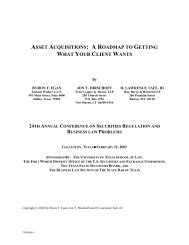fiduciary duty issues in m&a transactions - Jackson Walker LLP
fiduciary duty issues in m&a transactions - Jackson Walker LLP
fiduciary duty issues in m&a transactions - Jackson Walker LLP
You also want an ePaper? Increase the reach of your titles
YUMPU automatically turns print PDFs into web optimized ePapers that Google loves.
e other examples of bad faith yet to be proven or alleged, butthese three are the most salient.The third of these examples describes, and is fully consistent with, the lackof good faith conduct that the Caremark court held was a “necessary condition”for director oversight liability, i.e., “a susta<strong>in</strong>ed or systematic failure of the boardto exercise oversight – such as an utter failure to attempt to assure a reasonable<strong>in</strong>formation and report<strong>in</strong>g system exists....” Indeed, our op<strong>in</strong>ion <strong>in</strong> Disney citedCaremark with approval for that proposition. Accord<strong>in</strong>gly, the Court of Chanceryapplied the correct standard <strong>in</strong> assess<strong>in</strong>g whether demand was excused <strong>in</strong> this casewhere failure to exercise oversight was the basis or theory of the pla<strong>in</strong>tiffs’ claimfor relief.It is important, <strong>in</strong> this context, to clarify a doctr<strong>in</strong>al issue that is critical tounderstand<strong>in</strong>g <strong>fiduciary</strong> liability under Caremark as we construe that case. Thephraseology used <strong>in</strong> Caremark and that we employ here – describ<strong>in</strong>g the lack ofgood faith as a “necessary condition to liability” – is deliberate. The purpose ofthat formulation is to communicate that a failure to act <strong>in</strong> good faith is notconduct that results, ipso facto, <strong>in</strong> the direct imposition of <strong>fiduciary</strong> liability. Thefailure to act <strong>in</strong> good faith may result <strong>in</strong> liability because the requirement to act <strong>in</strong>good faith “is a subsidiary element[,]” i.e., a condition, “of the fundamental <strong>duty</strong>of loyalty.” It follows that because a show<strong>in</strong>g of bad faith conduct, <strong>in</strong> the sensedescribed <strong>in</strong> Disney and Caremark, is essential to establish director oversightliability, the <strong>fiduciary</strong> <strong>duty</strong> violated by that conduct is the <strong>duty</strong> of loyalty.This view of a failure to act <strong>in</strong> good faith results <strong>in</strong> two additionaldoctr<strong>in</strong>al consequences. First, although good faith may be described colloquiallyas part of a “triad” of <strong>fiduciary</strong> duties that <strong>in</strong>cludes the duties of care and loyalty,the obligation to act <strong>in</strong> good faith does not establish an <strong>in</strong>dependent <strong>fiduciary</strong> <strong>duty</strong>that stands on the same foot<strong>in</strong>g as the duties of care and loyalty. Only the lattertwo duties, where violated, may directly result <strong>in</strong> liability, whereas a failure to act<strong>in</strong> good faith may do so, but <strong>in</strong>directly. The second doctr<strong>in</strong>al consequence is thatthe <strong>fiduciary</strong> <strong>duty</strong> of loyalty is not limited to cases <strong>in</strong>volv<strong>in</strong>g a f<strong>in</strong>ancial or othercognizable <strong>fiduciary</strong> conflict of <strong>in</strong>terest. It also encompasses cases where the<strong>fiduciary</strong> fails to act <strong>in</strong> good faith. As the Court of Chancery aptly put it <strong>in</strong>Guttman, “[a] director cannot act loyally towards the corporation unless she acts<strong>in</strong> the good faith belief that her actions are <strong>in</strong> the corporation’s best <strong>in</strong>terest.”We hold that Caremark articulates the necessary conditions predicate fordirector oversight liability: (a) the directors utterly failed to implement anyreport<strong>in</strong>g or <strong>in</strong>formation system or controls; or (b) hav<strong>in</strong>g implemented such asystem or controls, consciously failed to monitor or oversee its operations thusdisabl<strong>in</strong>g themselves from be<strong>in</strong>g <strong>in</strong>formed of risks or problems requir<strong>in</strong>g theirattention. In either case, imposition of liability requires a show<strong>in</strong>g that thedirectors knew that they were not discharg<strong>in</strong>g their <strong>fiduciary</strong> obligations. Wheredirectors fail to act <strong>in</strong> the face of a known <strong>duty</strong> to act, thereby demonstrat<strong>in</strong>g a5446095v.120
















